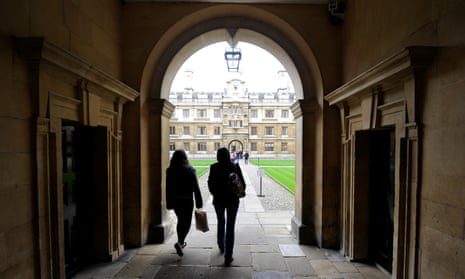Lawyers and women’s groups have condemned a decision by Cambridge University to not investigate some students’ complaints of sexual misconduct, including rape, warning it was potentially unlawful.
Their comments came after a ruling this summer that sexual misconduct should no longer be covered by the university’s general disciplinary regulations for students.
Two female students have been informed that their complaints of sexual assault and rape will not be taken forward because of the decision, according to the Cambridge student newspaper Varsity.
It reported that one of the chairs of Cambridge’s disciplinary committee, which is independent of the university’s central administration, ruled in June that sexual misconduct should not fall under the definition of harassment set out in the general regulations for discipline.
One of the complainants affected said she was told her allegations could not be investigated because there was no other regulation in the general disciplinary code that deals with sexual misconduct.
The university is introducing a procedure on 1 October that will define sexual misconduct as a breach of the rules of behaviour for students. But this system is prospective, meaning that complaints about sexual misconduct that occurred before that date – even if reported later – will be investigated under the old procedures.
Georgina Calvert-Lee, senior counsel at McAllister Olivarius, a law firm that has represented many victims of sexual misconduct at UK universities, said the decision could be taken to judicial review on the grounds it was “unlawful, irrational and procedurally improper”.
She said: “It effectively deprives students of any internal recourse for sexual assault, which would seem to be in breach of at least the university’s public sector equality duty, and so unlawful. I do not see how a university can comply with this duty, if it refuses to consider any sexual misconduct complaints if based on acts occurring before 1 October 2019.”
Calvert-Lee added that the decision also seemed contrary to the rules of natural justice and procedurally unfair. She said: “The university has progressed sexual misconduct complaints under its regulations relating to harassment in the recent past. Why should some students be denied access to a complaints process, while others were given access to it?”
The decision also appears to contradict the university’s procedure on student harassment and sexual misconduct, revised last year, which states that the definition of harassment in the general regulations “covers acts of sexual misconduct”.
Kate Litman, the women’s officer at Cambridge students union, said the discipline committee’s ruling was appalling. She added: “This means that, until the new reformed disciplinary procedure comes into place on 1 October, the university cannot take forward complaints of sexual misconduct. In the interim months the university is seriously failing students who need to access the procedure.”
Sarah Green, the director of End Violence Against Women, said Cambridge “cannot have a situation where there is no process to deal with sexual misconduct and violence”. She added: “The vice-chancellor should step in to resolve this now.”
Cris McCurley, a member of the Law Society’s access to justice committee who specialises in working with women who have been raped, said the decision appeared to reflect the wider lack of justice experienced by victims of rape. She said: “If universities are not prepared to adhere to their obligations and their duty of care then I can imagine there will be some significant legal challenges on this.”
A Cambridge University spokeswoman said: “All cases of sexual misconduct where the student wishes to pursue a formal complaint will be investigated. Cases that constitute harassment will be taken forward under the existing regulations.
“From 1 October this year, sexual misconduct will be explicitly defined as a breach of the rules of behaviour for students, allowing cases of sexual misconduct that do not constitute harassment to be taken forward. This will only apply to incidents that occur after 1 October.”









